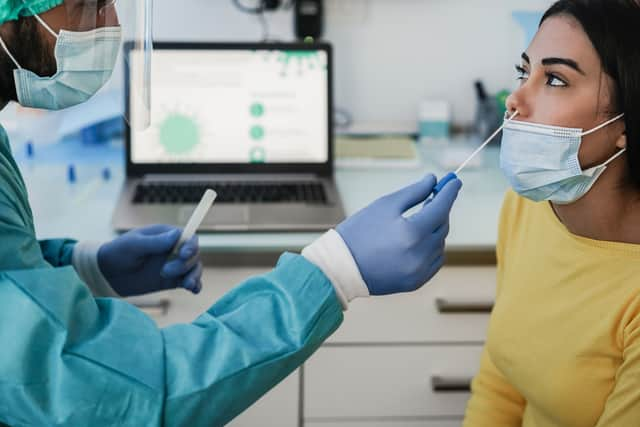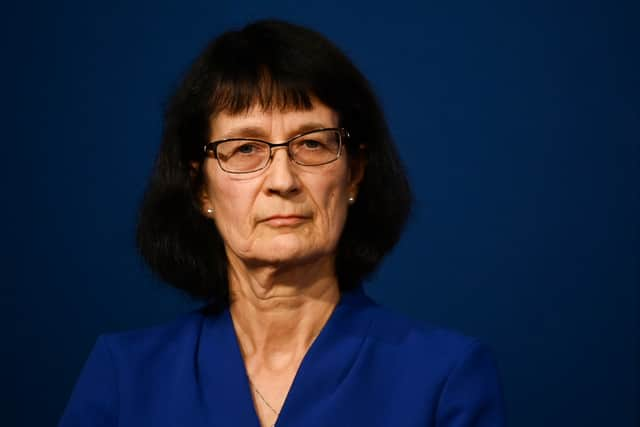Covid in London: Where are Covid-19 rates growing fastest and how have hospital admissions increased?
and live on Freeview channel 276
Hospital admissions for Covid-19 have soared by 44% in London, with more than 1,100 patients brought into wards in the last week of June, latest health data has revealed.
It comes as infections across the UK rise by 32% - or half a million - in a week, with around 2.3m people thought to have had the disease at the end of June, the highest since late April.


Advertisement
Hide AdAdvertisement
Hide AdBut this is still below the record high of 4.9m at the peak of the Omicron BA.2 wave in March.
Data analysis by LondonWorld’s sister title NationalWorld has also found early signs of a rise in intensive care admissions among older age groups.
How much have hospital admissions risen in London?
A total of 1,154 Covid patients were admitted to hospital in the week ending on Sunday, June 26, compared to 804 the previous week - while just two of London’s 18 hospital trusts saw admissions fall.
This increase means the number of patients hospitalised with Covid-19 in London has risen by 44%
Advertisement
Hide AdAdvertisement
Hide AdKing’s College Hospital NHS trust saw the highest number of Covid admissions in the week ending June 26, with 146 patients, compared to Barts Health NHS trust with 106 admissions.
While Imperial College Healthcare, Royal Free London and London North West University Healthcare NHS trusts saw 99, 93, and 80 patients admitted respectively.
Loading....
The trusts with the joint lowest Covid admissions were Kingston Hospital and Barking, Havering and Redbridge University Hospitals NHS trusts which both admitted 25 patients.
North Middlesex University Hospital NHS trust had 26 patients while Croydon Health Services NHS trust had 29.
Advertisement
Hide AdAdvertisement
Hide AdThe Hillingdon Hospitals NHS trust admitted 32 patients and was one of only two trusts to see admissions fall from the previous week, with 42 patients on June 19, a drop of 24%.
While the Chelsea and Westminster Hospital NHS trust saw a drop of 25%, with 53 patients admitted week ending June 19, and 40 as of the week ending June 26.
Where are Covid rates rising in London?
Modelling suggests between 3.1% and 4.9% of people in each London borough had Covid-19 as of June 25.
While the five council areas in the capital with the fastest growing rates are Southwark, Lambeth, Harrow, Newham and Haringey.
Advertisement
Hide AdAdvertisement
Hide AdOf the 333 local authority areas in England, Southwark was ranked eighth for the fastest rising Covid-19 rate as of June 25, Office for National Statistics (ONS) data has found.
Loading....
While Lambeth was ranked 10th; Harrow was ranked 17th; Newham was ranked 19th; and Haringey was ranked 24th.
One in 25 Southwark, Harrow and Newham residents had Covid-19 as of June 25, compared to one in 20 Lambeth residents and one in 30 people living in Haringey.
The London boroughs with the slowest growing Covid-19 rates were Greenwich, ranked 120th; Havering, ranked 118th; and Kingston-upon-Thames, Merton, and Richmond-upon-Thames, which were all jointly ranked 115th.
What are health experts saying?
Health authorities are continuing to encourage caution.
Advertisement
Hide AdAdvertisement
Hide AdPeople are advised to take up the coronavirus vaccines and to try to stay at home if they have symptoms, while mask wearing in crowded spaces is described as “sensible”.
Dr Mary Ramsay, clinical programme director at the UK Health Security Agency (UKHSA), said: “We continue to see an increase in Covid-19 data, with a rise in case rates and hospitalisations in those aged 65 and over, and outbreaks in care homes.
“We can also now see a rise in ICU admissions in older age groups.
“It’s reassuring that 83.5% of people aged 75 and over have had a vaccine in the past six months but we urge the remaining 16.5%, as well as those living in care homes or who are clinically vulnerable, to get their spring booster for protection against serious illness.
Advertisement
Hide AdAdvertisement
Hide Ad“Vaccination remains the best defence against severe disease and hospitalisation.”
She added: “Covid-19 has not gone away and we should all remember to keep up good hand and respiratory hygiene.
“It is also sensible to wear a face covering in crowded, enclosed spaces.
“If you have any symptoms of a respiratory infection, and a high temperature or feel unwell, try to stay at home or away from others – especially elderly or vulnerable people.
Advertisement
Hide AdAdvertisement
Hide AdWhile Professor Kevin Fenton, London’s public health director, has warned: “With risingCovid-19 infections, people who are at increased risk of severe disease and hospitalisation need to ensure they are well protected.
“The Covid-19 vaccine provides optimal protection even if you have already had the infection naturally.”
What does TfL say about masks?
Dame Jenny Harries, from the UKHSA, has said the official guidance, that masks are voluntary but can help reduce the chances of infection spreading in crowded and enclosed spaces, has not changed - despite telling the BBC she has been wearing a mask more often due to the raised risk.
She said: “So I haven’t been routinely wearing one, but I do routinely carry one in my handbag wherever I go.
Advertisement
Hide AdAdvertisement
Hide Ad“Actually I have worn it in the last week for the very reason that I’m doing exactly what I’ve said, I’m adapting to the changing prevalence of infection.


“If I was symptomatic and had to go out, I would definitely wear one - clearly I would avoid doing that at all cost. In fact, if I got any respiratory infection it’s a good thing to do and I think it’s a new lesson for the country.”
However, despite the latest wave being driven by the new Omicron variants BA.4 and BA.5, TfL says it currently does not intend to begin enforcing mask wearing on its services again.
LondonWorld understands the transport operator has no plans to change its advice or guidance on face coverings.
Advertisement
Hide AdAdvertisement
Hide AdA TfL spokesperson said: “During the pandemic we consistently encouraged wearing face coverings to keep customers and staff as safe as possible.
“We continue to encourage everyone to take appropriate action to keep themselves safe, including wearing face covering if they wish and using hand sanitiser.
“More and more Londoners are returning to our services, along with tourists from around the world, and London’s transport network remains a safe, clean environment ready to help people travel across the capital as we continue to recover from the pandemic.”
